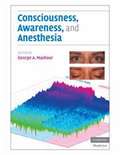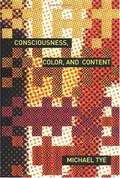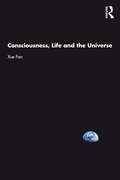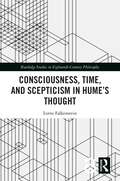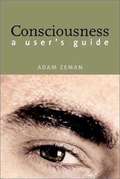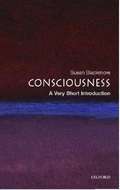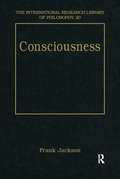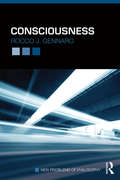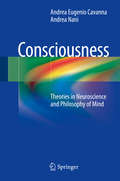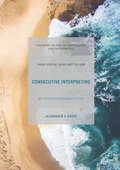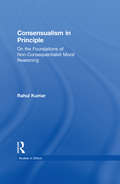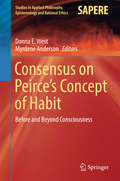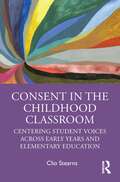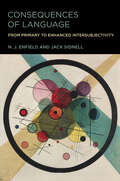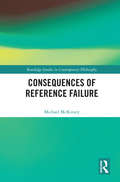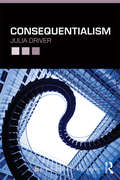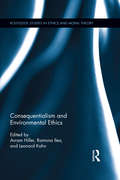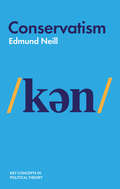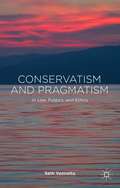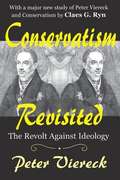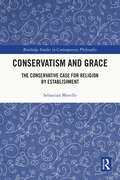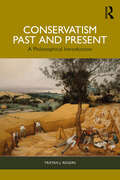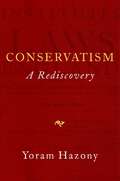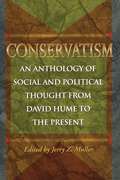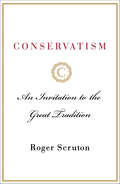- Table View
- List View
Consciousness, Awareness, and Anesthesia
by George A. MashourHypnosis, amnesia, and immobility are three major therapeutic endpoints of general anesthesia. In one to two cases out of a thousand, hypnosis and amnesia are not achieved - often leaving a patient immobile but capable of experiencing and remembering intraoperative events. Awareness during general anesthesia is one of the most dreaded complications of surgery and is feared by patients and clinicians alike. Despite many advances in the field, there are also a number of unresolved questions that persist. Some of the difficulties in the detection and prevention of awareness during anesthesia relate to the underlying complexities of the neuroscientific basis of consciousness. Consciousness, Awareness, and Anesthesia is a multidisciplinary approach to both the scientific problem of consciousness and the clinical problem of awareness during general anesthesia. An international cadre of authors with expertise in anesthesiology, neurobiology, and philosophy provides a cutting-edge perspective. No other book on the subject has drawn from such a breadth of scholarship.
Consciousness, Color, and Content
by Michael TyeExperiences and feelings are inherently conscious states. There is something it is like to feel pain, to have an itch, to experience bright red. Philosophers call this sort of consciousness "phenomenal consciousness."
Consciousness, Life and the Universe
by Xue FanWhat is consciousness? What is life? What is the universe? This book explores these three interconnected questions, providing deep insights into the past, present and future of consciousness research. Consciousness, Life and the Universe builds a unified view of consciousness across biological, chemical and physical scales, tracing the natural connections from the infinitesimally small to the infinitely big; from quantum fields and elementary particles to molecules, cells and living organisms to the cosmos; from the evolution of life to the evolution of the universe and to the future of humanity. The book provides a unified framework for future consciousness studies and identifies the scientific and technological approaches that are essential for further understanding consciousness. Through this pioneering research approach, the book clearly redefines consciousness and life and conceives a plausible view of the origin and nature of the universe. This is a must-read for students and researchers in consciousness studies, cognitive psychology, cognitive science and neuroscience, as well as anyone interested in the biological and physical basis of consciousness and the history and evolution of consciousness research.
Consciousness, Time, and Scepticism in Hume’s Thought (Routledge Studies in Eighteenth-Century Philosophy)
by Lorne FalkensteinDavid Hume’s philosophical work presents the reader with a perplexing mix of constructive accounts of empirically guided belief and destructive sceptical arguments against all belief. This book reconciles this conflict by showing that Hume intended his scepticism to be remedial. It immunizes us against the influence of “unphilosophical” causes of belief, determining us to proportion our beliefs to the evidence.In making this case, this book develops Humean positions on topics Hume did not discuss in detail but that are of interest to contemporary philosophers: consciousness and the unity of consciousness, temporal experience, visual spatial perception, the experience of colour and other qualia, objective experience, and spatially extended minds. It also challenges currently accepted interpretations of Hume’s views on the finite divisibility of space and time, vacuum, the duration of unchanging objects, and identity over time. It deals with criticisms of Hume that were raised by his contemporaries, notably by Thomas Reid, draws attention to earlier seventeenth‑ and eighteenth‑century work that has bearing on the interpretation of Hume’s thought, and compares Hume’s achievements with those of later nineteenth‑century psychologists and philosophers.Consciousness, Time, and Scepticism in Hume’s Thought will appeal to scholars and advanced students interested in Hume, history of philosophy, and early modern theories of perception, time, and consciousness.
Consciousness: A User's Guide
by Adam ZemanThis engaging and readable book provides an introduction to consciousness that does justice both to the science and to the philosophy of consciousness, that is, the mechanics of the mind and the experience of awareness. The book opens with a general discussion of the brain and of consciousness itself. Then, exploring the areas of brain science most likely to illuminate the basis of awareness, Zeman focuses on the science of sleep and waking and on the science of vision. He describes healthy states and disorders--epilepsy, narcolepsy, blindsight and hallucinations after stroke--that provide insights into the capacity for consciousness and into its contents. And he tracks the evolution of the brain, the human species, and human culture and surveys the main current scientific theories of awareness, pioneering attempts to explain how the brain gives rise to experience. Zeman concludes by examining philosophical arguments about the nature of consciousness. A practicing neurologist, he animates his text with examples from the behavioral and neurological disorders of his patients and from the expanding mental worlds of young children, including his own. His book is an accessible and enlightening explanation of why we are conscious.
Consciousness: A Very Short Introduction
by Susan Blackmore"The last great mystery for science," consciousness has become a controversial topic. Consciousness: A Very Short Introduction challenges readers to reconsider key concepts such as personality, free will, and the soul. How can a physical brain create our experience of the world? What creates our identity? Do we really have free will? Could consciousness itself be an illusion? Exciting new developments in brain science are opening up these debates, and the field has now expanded to include biologists, neuroscientists, psychologists, and philosophers. This book clarifies the potentially confusing arguments and clearly describes the major theories, with illustrations and lively cartoons to help explain the experiments. Topics include vision and attention, theories of self, experiments on action and awareness, altered states of consciousness, and the effects of brain damage and drugs. This lively, engaging, and authoritative book provides a clear overview of the subject that combines the perspectives of philosophy, psychology, and neuroscience--and serves as a much-needed launch pad for further exploration of this complicated and unsolved issue.
Consciousness: Essays On Ned Block's Philosophy Of Mind And Consciousness (The International Research Library of Philosophy #Vol. 20)
by Frank JacksonBrings together some of the most important research publications on the philosophical problem of consciousness. It includes a detailed introduction that surveys the leading issues in the current debate.
Consciousness: New Essays On Psychopathology And Theories Of Consciousness (New Problems of Philosophy)
by Rocco J GennaroConsciousness is arguably the most important interdisciplinary area in contemporary philosophy of mind, with an explosion of research over the past thirty years from philosophers, psychologists, and scientists. It is also perhaps the most puzzling aspect of the world despite the fact that it is familiar to each of us. Consciousness also seems resistant to any straightforward physical explanation. This book introduces readers to the contemporary problem of consciousness, providing a clear introduction to the overall landscape and a fair-minded critical survey of various theories of consciousness. Beginning with essential historical background to the problem of consciousness, Rocco Gennaro explores the following key topics and debates: the metaphysical problem of consciousness, including varieties of dualism and materialism; consciousness and neuroscience, particularly the question of whether consciousness can be reduced to brain activity or attentional mechanisms; representational and cognitive theories of consciousness; consciousness and psychopathology; animals, machines, and consciousness. Extensive use is made of interesting phenomena throughout the book, ranging from blindsight, synaesthesia, and change blindness to phantom limb syndrome, split-brain cases, and dissociative identity disorder (DID). The inclusion of chapter summaries, annotated further reading, and a glossary make this book essential reading for anyone seeking a clear and informative overview of the problem of consciousness, not only in philosophy but related fields such as psychology and cognitive science.
Consciousness: Theories in Neuroscience and Philosophy of Mind
by Andrea Eugenio Cavanna Andrea NaniThis book reviews some of the most important scientific and philosophical theories concerning the nature of mind and consciousness. Current theories on the mind-body problem and the neural correlates of consciousness are presented through a series of biographical sketches of the most influential thinkers across the fields of philosophy of mind, psychology and neuroscience. The book is divided into two parts: the first is dedicated to philosophers of mind and the second, to neuroscientists/experimental psychologists. Each part comprises twenty short chapters, with each chapter being dedicated to one author. A brief introduction is given on his or her life and most important works and influences. The most influential theory/ies developed by each author are then carefully explained and examined with the aim of scrutinizing the strengths and weaknesses of the different approaches to the nature of consciousness.
Consecutive Interpreting
by Alexander V. KozinThis book sheds light on the phenomenon of consecutive interpreting. It combines phenomenological and empirical analyses to build a communication theory of interpreting. The author begins by reviewing mainstream research on consecutive interpreting and then dissociates himself from it, conducting a three-tier analysis of interpreting data. He concludes by presenting an alternative theory of consecutive interpreting. As he makes clear from the outset, a new and combined methodology for consecutive interpreting needs to be constructed to satisfy both the relation of the phenomenon to experience as well as its social foundation. He also stresses the potential within the humanities for wider employment of the phenomenological empirical method. This book will appeal to students and scholars of linguistics, translation, phenomenology, social interaction and communication
Consensualism in Principle: On the Foundations of Non-Consequentialist Moral Reasoning (Studies in Ethics)
by Rahul KumarThis book presents and argues for a suitably articulated version of consensualism as a form of Kantian moral theory with an ability to powerfully illuminate the moral intuitions to which Kantian and utilitarian theories have traditionally appealed.
Consensus on Peirce’s Concept of Habit: Before and Beyond Consciousness (Studies in Applied Philosophy, Epistemology and Rational Ethics #31)
by Donna E. West Myrdene AndersonThis book constitutes the first treatment of C. S. Peirce s unique concept of habit. Habit animated the pragmatists of the 19th and early 20th centuries, who picked up the baton from classical scholars, principally Aristotle. Most prominent among the pragmatists thereafter is Charles Sanders Peirce. In our vernacular, habit connotes a pattern of conduct. Nonetheless, Peirce s concept transcends application to mere regularity or to human conduct; it extends into natural and social phenomena, making cohesive inner and outer worlds. Chapters in this anthology define and amplify Peircean habit; as such, they highlight the dialectic between doubt and belief. Doubt destabilizes habit, leaving open the possibility for new beliefs in the form of habit-change; and without habit-change, the regularity would fall short of habit conforming to automatic/mechanistic systems. This treatment of habit showcases how, through human agency, innovative regularities of behavior and thought advance the process of making the unconscious conscious. The latter materializes when affordances (invariant habits of physical phenomena) form the basis for modifications in action schemas and modes of reasoning. Further, the book charts how indexical signs in language and action are pivotal in establishing attentional patterns; and how these habits accommodate novel orientations within event templates. It is intended for those interested in Peirce s metaphysic or semiotic, including both senior scholars and students of philosophy and religion, psychology, sociology and anthropology, as well as mathematics, and the natural sciences. "
Consent in the Childhood Classroom: Centering Student Voices Across Early Years and Elementary Education
by Clio StearnsConsent in the Childhood Classroom challenges typical premises of social and emotional learning, self-regulation, and putative misbehavior by centering the theme of consent in the experiences of young children and their teachers. Early childhood and elementary teachers often face disruptions and acts of dissent from young students, without a helpful conceptual framework for understanding how these expressions may stem from social injustices, developmental nuances, and problematic assumptions about the nature of children’s agency. By posing complex yet relatable questions about the presumptions of authority, positivity, and routines in learning environments, and drawing on classroom anecdotes along with interviews with children and teachers, this book offers an accessible approach to cultivating expansive relationships in the classroom, a vision for a richer and more mutual education, and a clearer understanding of what school means from the perspective of the child.
Consequences of Language: From Primary to Enhanced Intersubjectivity
by Jack Sidnell N. J. EnfieldWhat is it about humans that makes language possible, and what is it about language that makes us human?If you are reading this, you have done something that only our species has evolved to do. You have acquired a natural language. This book asks, How has this changed us? Where scholars have long wondered what it is about humans that makes language possible, N. J. Enfield and Jack Sidnell ask instead, What is it about humans that is made possible by language? In Consequences of Language their objective is to understand what modern language really is and to identify its logical and conceptual consequences for social life. Central to this undertaking is the concept of intersubjectivity, the open sharing of subjective experience. There is, Enfield and Sidnell contend, a uniquely human form of intersubjectivity, and it is essentially intertwined with language in two ways: a primary form of intersubjectivity was necessary for language to have begun evolving in our species in the first place and then language, through its defining reflexive properties, transformed the nature of our intersubjectivity. In the authors&’ analysis, social accountability—the bedrock of society—is grounded in this linguistically transformed, enhanced kind of intersubjectivity.The account of the language-mind-society connection put forward in Consequences of Language is one of unprecedented reach, suggesting new connections across disciplines centrally concerned with language—from anthropology and philosophy to sociology and cognitive science—and among those who would understand the foundational role of language in making us human.
Consequences of Reference Failure (Routledge Studies in Contemporary Philosophy)
by Michael McKinseyThis book defends the Direct Reference (DR) thesis in philosophy of language regarding proper names and indexical pronouns. It uniquely draws out the significant consequences of DR when it is conjoined with the fact that these singular terms sometimes fail to refer. Even though DR is widely endorsed by philosophers of language, many philosophically important and radically controversial consequences of the thesis have gone largely unexplored. This book makes an important contribution to the DR literature by explicitly addressing the consequences that follow from DR regarding failure of reference. Michael McKinsey argues that only a form of neutral free logic can capture a revised concept of logical truth that is consistent with the fact that any sentence of any form that contains a directly referring genuine term can fail to be either true or false on interpretations where that term fails to refer. He also explains how it is possible for there to be true (or false) sentences that contain non-referring names, even though this possibility seems inconsistent with DR. Consequences of Reference Failure will be of interest to philosophers of language and logic and linguists working on Direct Reference.
Consequentialism (New Problems of Philosophy)
by Julia DriverConsequentialism is the view that the rightness or wrongness of actions depend solely on their consequences. It is one of the most influential, and controversial, of all ethical theories. In this book, Julia Driver introduces and critically assesses consequentialism in all its forms. After a brief historical introduction to the problem, Driver examines utilitarianism, and the arguments of its most famous exponents, John Stuart Mill and Jeremy Bentham, and explains the fundamental questions underlying utilitarian theory: what value is to be specified and how it is to be maximized. Driver also discusses indirect forms of consequentialism, the important theories of motive consequentialism and virtue consequentialism, and explains why the distinction between subjective and objective consequentialism is so important. Including helpful features such as a glossary, chapter summaries, and annotated further reading at the end of each chapter, Consequentialism is ideal for students seeking an authoritative and clearly explained survey of this important problem.
Consequentialism and Environmental Ethics: Consequentialism And Environmental Ethics (Routledge Studies in Ethics and Moral Theory)
by Ramona Ilea Avram Hiller Leonard KahnThis volume works to connect issues in environmental ethics with the best work in contemporary normative theory. Environmental issues challenge contemporary ethical theorists to account for topics that traditional ethical theories do not address to any significant extent. This book articulates and evaluates consequentialist responses to that challenge. Contributors provide a thorough and well-rounded analysis of the benefits and limitations of the consequentialist perspective in addressing environmental issues. In particular, the contributors use consequentialist theory to address central questions in environmental ethics, such as questions about what kinds of things have value; about decision-making in light of the long-term, intergenerational nature of environmental issues; and about the role that a state’s being natural should play in ethical deliberation.
Conservatism (Key Concepts in Political Theory)
by Edmund NeillConservatism is often labelled as a ‘disposition’, ‘tradition’, or even a set of knee-jerk reactions, rather than an ideology, and its suspicion of grand theorising has lent itself to this characterization. In this book, leading political theorist Edmund Neill challenges this view. He argues that conservatism is better identified as an ideology, albeit one that, rather than putting forward positive values like ‘liberty’ or ‘equality’, conceptualizes human conduct as being partially dependent on forces beyond human volition, and prioritizes the cautious management of change. He charts the evolution of conservative thought from the French Revolution to the present, examining how conservatives responded to disruptions to traditional order across the nineteenth and twentieth centuries. Drawing on examples from Britain, France and the United States, Neill concludes with some reflections on the challenges (and opportunities) that contemporary populism presents for conservatism. This accomplished overview is essential reading for any student or scholar working in political theory and political philosophy, especially those with a particular interest in ideologies and conservatism.
Conservatism And Pragmatism
by Seth VannattaConservatism and Pragmatism illustrates the intersections between classical British Conservative thought and classical American Pragmatist philosophy with regard to methodology in politics, ethics, and law.
Conservatism Revisited: The Revolt Against Ideology
by Peter Viereck Claes G. RynPeter Viereck, poet and historian, is one of the principle theoreticians of conservatism in modern American political thought. In this classic work, Viereck undertakes a penetrating and unorthodox analysis of that quintessential conservative, Prince Metternich, and offers evidence that cultural and political conservatism may perhaps be best adapted to sustain a free and reasonable society.
Conservatism and Grace: The Conservative Case for Religion by Establishment (Routledge Studies in Contemporary Philosophy)
by Sebastian MorelloThis book offers a systematic and detailed examination of the conservative case for religion by establishment. In doing so, the author demonstrates that the conservative political tradition is rooted in an inescapably religious worldview, and in turn shows what the future of conservatism might be. The author begins the book by analysing the thought of prominent proponents of secular conservatism, chiefly examining the work of Roger Scruton. The author develops a case to show that Scruton’s arguments on the privatisation of religion are in tension with his basing of a conservative political settlement on "transcendent bonds". The author then examines alternatives to secular conservatism, especially the chief religious and metaphysical commitments of early conservatives, Edmund Burke and Joseph de Maistre. Finally, in seeking to establish a foundational argument for religion by establishment within the conservative tradition, and more broadly to unify the diverse commitments and objections of conservatives, the author develops a case that draws on Scruton’s personalism, as well as the thought of Martin Buber, Andrew Pinsent, and Robert Spaemann. In the course of developing his foundational argument, the author incorporates findings from experimental psychology and themes from contemporary theology. The result is a convincing argument in favour of establishmentarian conservatism, as well as the role of religious ideas in our self-understanding as individuals and as a political community. Conservatism and Grace will appeal to scholars and advanced students interested in political philosophy, philosophy of religion, theology, and the history of conservatism.
Conservatism, Past and Present: A Philosophical Introduction
by Tristan J. RogersIn Conservatism, Past and Present: A Philosophical Introduction, Tristan J. Rogers argues that philosophical conservatism is a coherent and compelling set of historically rooted ideas about conserving and promoting the human good. Part I, “Conservatism Past,” presents a history of conservative ideas, exploring themes, such as the search for wisdom, the limits of philosophy, reform in preference to revolution, the relationship between authority and freedom, and liberty as a living tradition. Major figures include Aristotle, Saint Thomas Aquinas, Edmund Burke, G.W.F. Hegel, and Roger Scruton. Part II, “Conservatism Present,” applies philosophical conservatism to contemporary conservative politics, focusing on issues such as nationalism, populism, the family, education, and responsibility. Rogers shows that conservatism has been defined differently at different times: as a loose set of connected ideas reacting against the French Revolution; as a kind of disposition or instinct in favor of the status quo; and more recently as any ideas opposed to the political left. But he also allows a set of questions to guide his argument for conservatism’s merits: What is conservatism? Is it a coherent and attractive philosophy? What are conservatives for? And how is today’s conservatism related to its past? In his answers, Rogers paints a compelling and coherent picture of an aligned and attractive set of ideas.
Conservatism: A Rediscovery
by Yoram HazonyThe idea that American conservatism is identical to "classical" liberalism—widely held since the 1960s—is seriously mistaken. The award-winning political theorist Yoram Hazony argues that the best hope for Western democracy is a return to the empiricist, religious, and nationalist traditions of America and Britain—the conservative traditions that brought greatness to the English-speaking nations and became the model for national freedom for the entire world. Conservatism: A Rediscovery explains how Anglo-American conservatism became a distinctive alternative to divine-right monarchy, Puritan theocracy, and liberal revolution. After tracing the tradition from the Wars of the Roses to Burke and across the Atlantic to the American Federalists and Lincoln, Hazony describes the rise and fall of Enlightenment liberalism after World War II and the present-day debates between neoconservatives and national conservatives over how to respond to liberalism and the woke left. Going where no political thinker has gone in decades, Hazony provides a fresh theoretical foundation for conservatism. Rejecting the liberalism of Hayek, Strauss, and the "fusionists" of the 1960s, and drawing on decades of personal experience in the conservative movement, he argues that a revival of authentic Anglo-American conservatism is possible in the twenty-first century.
Conservatism: An Anthology of Social and Political Thought from David Hume to the Present
by Jerry Z. MullerAt a time when the label "conservative" is indiscriminately applied to fundamentalists, populists, libertarians, fascists, and the advocates of one or another orthodoxy, this volume offers a nuanced and historically informed presentation of what is distinctive about conservative social and political thought. It is an anthology with an argument, locating the origins of modern conservatism within the Enlightenment and distinguishing between conservatism and orthodoxy. Bringing together important specimens of European and American conservative social and political analysis from the mid-eighteenth century through our own day, Conservatism demonstrates that while the particular institutions that conservatives have sought to conserve have varied, there are characteristic features of conservative argument that recur over time and across national borders. The book proceeds chronologically through the following sections: Enlightenment Conservatism (David Hume, Edmund Burke, and Justus Möser), The Critique of Revolution (Burke, Louis de Bonald, Joseph de Maistre, James Madison, and Rufus Choate), Authority (Matthew Arnold, James Fitzjames Stephen), Inequality (W. H. Mallock, Joseph A. Schumpeter), The Critique of Good Intentions (William Graham Sumner), War (T. E. Hulme), Democracy (Carl Schmitt, Schumpeter), The Limits of Rationalism (Winston Churchill, Michael Oakeshott, Friedrich Hayek, Edward Banfield), The Critique of Social and Cultural Emancipation (Irving Kristol, Peter Berger and Richard John Neuhaus, Hermann Lübbe), and Between Social Science and Cultural Criticism (Arnold Gehlen, Philip Rieff). The book contains an afterword on recurrent tensions and dilemmas of conservative thought.
Conservatism: An Invitation to the Great Tradition (Pelican Ser.)
by Roger ScrutonA brief magisterial introduction to the conservative tradition by one of Britain’s leading intellectuals.“One of the most eloquent and even moving evocations of the conservative tradition in Western politics, philosophy and culture I have ever read . . . the ideal primer for those who are new to conservative ideas.” —Wall Street JournalIn Conservatism, Roger Scruton offers the reader an invitation into the world of political philosophy by explaining the history and evolution of the conservative movement over the centuries. With the clarity and authority of a gifted teacher, he discusses the ideology's perspective on civil society, the rule of law, freedom, morality, property, rights, and the role of the state. In a time when many claim that conservatives lack a unified intellectual belief system, this book makes a very strong case to the contrary, one that politically-minded readers will find compelling and refreshing.Scruton analyzes the origins and development of conservatism through the philosophies and thoughts of John Locke, Thomas Hobbes, Adam Smith and Milton Friedman, among others. He shows how conservative ideas have influenced the political sector through the careers of a diverse cast of politicians, such as Thomas Jefferson, Benjamin Disraeli, Ronald Reagan and Margaret Thatcher. He also takes a close look at the changing relationship between conservative politics, capitalism, and free markets in both the UK and the US. This clear, incisive guide is essential reading for anyone wishing to understand Western politics and policies, now and over the last three centuries.
